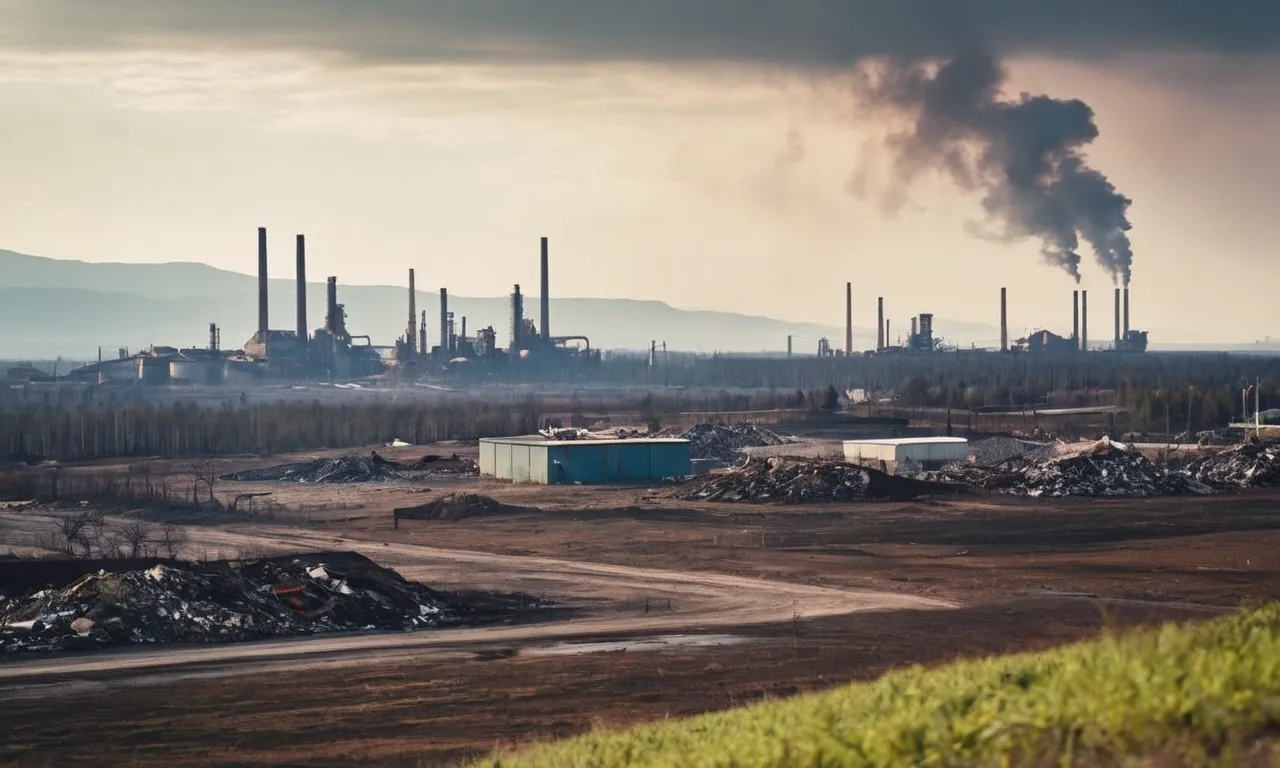My God What Have We Done: Examining Humanity’S Darkest Moments
Have you ever looked around at the state of the world and wondered, my god, what have we done? From climate change to endless wars, humanity seems to lurch from one self-created disaster to another. If you’re looking for answers about how we got here and what it all means, you’ve come to the right place.
In a nutshell, humanity’s current predicaments are the result of certain flaws in human nature, as well as tremendous technological advances without sufficient wisdom to guide them. By examining some of the darkest chapters in human history, we can gain insight into how we went wrong and what we need to do to right the ship.
In this comprehensive article, we will examine humanity’s darkest hours, from atrocities like the Holocaust and war crimes to man-made environmental catastrophes. We will look at the social and psychological factors that enabled these tragedies, and analyze what lessons we can learn to create a more just, sustainable future.
With hope and vigilance, we can still steer humanity towards the light.
Examining Genocide: The Horrors of Holocaust and War Crimes
The Holocaust: How Did It Happen?
The Holocaust, also known as the Shoah in Hebrew, was the state-sponsored mass persecution and murder of approximately 6 million Jewish people by Nazi Germany and its allies and collaborators from 1941 to 1945 (United States Holocaust Memorial Museum, 2023).
This genocide occurred in the context of World War II, with antisemitism and the concept of lebensraum (living space for an expanded Germany) contributing major ideological rationales.
The Nazis aimed for the extermination of European Jewry, viewing Jews as an existential threat based on racist ideology. This resulted in a calculated, systematic effort involving ghettos, mobile killing units, concentration camps, forced labor camps, and death camps with gas chambers like Auschwitz-Birkenau being utilized to carry out mass murder (Yad Vashem, 2023).
While ordinary German citizens may not have known the full details, there was widespread willful ignorance and implicit compliance with broader policies of persecution. Overall, the Holocaust stands out for its immense cruelty and death toll, representing humanity’s capacity for radical evil.
Other Genocides: A Recurring Nightmare
Tragically, mass murder did not begin or end with the Holocaust. Other 20th century genocides with over 1 million victims include the Armenian Genocide (1915-1923, 1-1.5 million deaths), Stalin’s Purges (1936-1938, over 1.2 million executions), the Cambodian Genocide (1975-1979, 1.5-2 million deaths), and the Rwandan Genocide (1994, 800,000-1 million deaths) (History, 2023).
While differing in context, these genocides reveal some common themes such as the deliberate dehumanization of target groups, ultranationalist rhetoric, opportunism amidst chaos, and public acquiescence.
Understanding how ordinary citizens can be manipulated into supporting or ignoring violence remains critical for prevention.
The Banality of Evil: How Ordinary People Commit Atrocities
Coined after the trial of Holocaust organizer Adolf Eichmann, the “banality of evil” refers to how normal, unexceptional people can end up performing horrific acts, especially under group dynamics of conformity and obedience to authority figures (Arendt, 1963).
Psychology experiments like the Milgram obedience study have further demonstrated people’s tendency to obey orders even if it causes harm (McLeod, 2017). Dangerous groupthink mentalities and diffusion of responsibility similarly enable violence.
Propagandistic rhetoric painting the victimized as subhuman threats facilitates moral disengagement.
Ultimately, coming to terms with humanity’s capacity for cruelty should inspire vigilance. As Edmund Burke said, “The only thing necessary for the triumph of evil is for good men to do nothing.” Education, empathy, and speaking truth to power remain vital.
Man Against Nature: Environmental Destruction and Climate Change
Deforestation and Mass Extinction: Destroying Nature’s Balance
Deforestation has been occurring at an alarming rate, with an estimated 18 million acres of forest being lost per year. The Amazon rainforest alone has seen 20% of its trees destroyed in recent decades.
This has led to the irreparable loss of biodiversity, as many species endemic to these forests have gone extinct. According to the UN Food and Agriculture Organization, we are losing 50,000 species globally each year due to deforestation and habitat loss.
This disruption of delicate ecosystems has far-reaching consequences that we are only beginning to grasp. As stewards of this planet, we must make forest conservation a priority before it is too late.
Climate Change: The Ultimate Failure of Stewardship
The global scientific consensus is clear – human activity, especially the burning of fossil fuels, has caused rapid climate change at a rate unprecedented in human history. Global temperatures have risen by 1.5°C since 1880, causing sea levels to rise, more extreme weather events, and disruption to ecosystems worldwide.
This warming is projected to reach catastrophic levels in coming decades if immediate action is not taken. Climate change represents humanity’s failure to be proper stewards of the only planet we have.
While the Paris Climate Agreement brought hope, progress has been slow and major emitters continue business as usual. We are running out of time to curb emissions and prevent further damage. Our children and grandchildren will inherit this crisis, making it arguably the greatest intergenerational injustice ever perpetrated by humankind.
Overpopulation and Resource Depletion: Victims of Our Own Success
The massive growth of the human population, exceeding 7.7 billion in 2024, is putting unsustainable strain on global resources. Fresh water sources are being depleted, including the vital Ogallala Aquifer in the U.S. which has lost 150 feet of water since the 1950s.
With forests shrinking, over 50% of land now degraded, and species dying off, we are fundamentally altering ecosystems worldwide. Fertile topsoil is being lost to erosion and desertification, threatening food production.
The UN warns that with current consumption patterns, we would need 1.75 Earths to sustainably meet human needs. Yet we have only this one planet. Our numbers and appetites have outgrown Earth’s capacity to regenerate itself.
We must curb overconsumption and aim for a smaller, sustainable population if humanity hopes to thrive.
The Perils of Progress: When Technology Outpaces Wisdom
Atomic Power: When Science Marches to War
The discovery of nuclear fission in the 1930s led to the creation of the most destructive weapons known to humankind. The atomic bombs dropped on Hiroshima and Nagasaki in 1945 killed over 200,000 people and ushered in the nuclear arms race of the Cold War era.
While atomic power promised cheap, abundant energy, it also enabled unprecedented means for mass destruction (DOE). World leaders scrambled to stockpile warheads, bringing the planet to the brink of nuclear annihilation and leading to dangerous proliferation in countries like North Korea and Iran today.
The Bulletin of the Atomic Scientists’ Doomsday Clock still warns that we are distressingly near self-annihilation, with the 2023 setting at just 90 seconds to midnight. As science continues to advance faster than our ability to ethically govern it, we must approach new discoveries with great care and wisdom.
The power of the atom, while promising, turned into a peril when grasped too hastily.
AI and Automation: Will It Replace or Enhance Us?
Artificial intelligence and robotics threaten widespread job loss, yet also promise to elevate human productivity and potential. Self-driving vehicles could prevent over 90% of car accidents due to human error, but may displace millions of truck and taxi drivers (McKinsey).
AI diagnosis systems like Watson cut medical errors dramatically, though reduce the need for doctors. Automation boosts factory output and precision exponentially, but largely eliminates manufacturing roles.
Rather than approaching technology with fear, we must steer it with foresight. Policies that retrain workers, share profits, and focus AI on enhancing human strengths rather than replacing them will allow us to reap the bounty of innovation. But neglecting to plan, we may exacerbate inequality.
If the wisdom of ethical governance lags behind, peril awaits.
Social Media and Misinformation: Hacking the Human Psyche
Social media promised to connect friends and family globally, yet has dangerously magnified misinformation, eroded privacy, and fomented discord. Platforms like Facebook and Twitter have become fertile ground for false news, conspiracy theories, and political extremism.
Their algorithms, geared to maximize “engagement,” exploit human psychology by appealing to outrage and fear. Disinformation spreads virally, sowing confusion and fracturing democracies.
However, through legislation like the 2021 Online Safety Bill, governments are beginning to rein in social media’s excesses. Tech leaders are being compelled to bolster security, remove illegal content faster, and minimize addictive design features.
Just as dangerous products like asbestos and leaded gasoline were once regulated, society is awakening to social media’s unintended harms. But outmaneuvering human nature will take wisdom and vigilance.
Greed and Inequality: Flaws in the System
The Cancer of Unchecked Capitalism
Unregulated capitalism has led to dangerous levels of inequality and greed around the world. The richest 1% own over 50% of the world’s wealth, while billions live in poverty. Multinational corporations exploit workers and resources in pursuit of profit, with little regard for human rights or environmental protection.
This cancer of unchecked capitalism concentrates wealth and power in the hands of a privileged few at the expense of the many.
Some examples of the harmful effects of unchecked capitalism include:
- Widening inequality – The world’s billionaires increased their wealth by $5 trillion during the COVID-19 pandemic while millions fell into extreme poverty.
- Environmental destruction – Fossil fuel companies have long obscured the science of climate change to protect profits while the planet burns.
- Human rights violations – Sweatshop labor, child labor and dangerous working conditions remain common in many industries’ supply chains.
Capitalism in its current form is unsustainable. Reforms such as progressive taxation, closing tax havens, empowering labor unions, environmental regulations and investments in public programs are urgently needed to reduce inequality and steer capitalism in a more just direction for people and the planet.
Racial, Gender and Economic Divides: A House Divided
Deep divides along racial, gender and economic lines continue to plague societies around the world. Discrimination and marginalization of minority groups remains shockingly pervasive, preventing true unity and inclusion.
For example, in the United States, the average Black family has less than 15% of the wealth of the average white family. The COVID-19 pandemic also had a disproportionate impact on minority communities.
Such economic disparities are the legacy of decades of racist policies and ongoing structural barriers.
Meanwhile, the gender pay gap persists globally, with women earning only 84% of what men earn. Occupational segregation, pay discrimination, domestic responsibilities and workplace harassment are all factors.
A house divided against itself cannot stand. Societies must prioritize justice, equity and human rights for all people, regardless of race, gender or economic status, in order to build a more fair and prosperous future for all.
Corruption and Lack of Accountability: Power Without Oversight
Corruption remains a massive drain on societies across the globe, costing trillions of dollars each year. When leaders and institutions are not held accountable, it allows graft, fraud and misuse of power to flourish at the expense of the people.
Some examples:
- Brazil lost $13.6 billion in its huge Petrobras scandal in 2014-2015.
- In Afghanistan, over $19 billion of U.S. reconstruction funding was lost between 2002-2014 due to corruption, fraud and abuse.
- A 2020 OECD report found that corruption costs West African countries $50 billion annually.
Tackling corruption requires transparency, oversight and accountability at all levels. Strict anti-corruption laws must be enforced. Independent watchdogs like auditors, a free press and whistleblowers are vital.
Ultimately, societies must reject conflicts of interest and demand both moral and legal integrity from public officials and institutions.
Paths to Redemption: Hope for the Future
Education and Empathy: Teaching Our Shared Humanity
Education that teaches empathy, compassion, and our shared humanity is key to avoiding the darkest moments of history. Studies show that prejudice thrives in ignorance, while education exposes common human experiences that transcend divisions.
An empathy-based curriculum, starting from a young age, can nurture caring citizens.
Organizations like Facing History and Ourselves provide resources to educators on teaching about racism, antisemitism, and other issues through a lens of our common humanity. Their approaches increase civic participation and engagement among students.
Widespread adoption of such curricula could profoundly impact society’s ability to resolve conflicts nonviolently.
Sustainable Technology and Economics: Smarter Innovation
Technological and economic systems that lead to exploitation of people and planet contribute to humanity’s darkest behaviors as groups compete for scarce resources. Sustainable, equitable innovation systems are vital.
The Nature of Cities advocates urban design centered on holistic human health and ecosystem restoration. With over 50% of people now living in cities, such urban planning approaches can drastically improve sustainability and quality of life.
Non-profit organizations like Tech Impact help marginalized communities build skills to thrive in modern economies through technology and innovation hubs.
Global Cooperation and Responsibility: We’re All in This Together
Many historical atrocities arose from propaganda that scapegoated vulnerable groups. Countering such narratives requires global responsibility. The UN Office on Genocide Prevention seeks to quickly identify and disrupt dangerous propaganda globally. Still, more grassroots action is needed.
Regular citizens should speak out against biased media, confront racist jokes, and invite open dialogue with those holding intolerant views. Changing hearts sometimes takes patience, but will prevent violence long-term.
Our digital age offers many ways for ordinary people to promote social cohesion locally and worldwide. We all must recognize our shared destiny.
Conclusion
Though humanity has stumbled badly at times, we are not doomed to repeat past mistakes. By facing the darker parts of our history with courage and honesty, we gain wisdom and perspective. If we nurture compassion, live sustainably, and work together globally, we can still build a just, peaceful and abundant future for all.
But we must remain vigilant, and challenge inhumanity whenever it arises. Our planet’s future depends on it.








